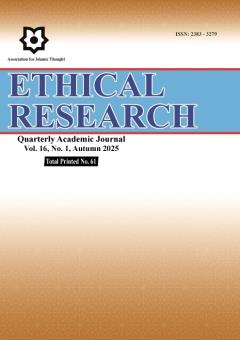Kwigereranya kugereranya ibyiciro byimyitwarire y'amayobera duhereye kuri Ibin Arabi na Teresa Avilai
Subject Areas : Ethics and Islamic Educationzahra abedini 1 , BakhshAli Ghanbari 2 , Abdul Hossein tarighi 3
1 -
2 -
3 - Assistant Professor, Department of Philosophy and Religions, Central Tehran Branch, Islamic Azad University, Tehran, Iran.
Keywords: Mystical path, seclusion, solitude, Ibn Arabi, Teresa of Avilai.,
Abstract :
The course and conduct of customs and the quality of officials and circumstances, and how they are in tariqat, and the progress of spiritual life has been compared to the course and journey. The seeker in his journey, from the moment he sets out and rises in pursuit of his completion, passes through various houses and stages on the way to reach his goal. The process is to go through the steps to refine and purify the soul; And the seeker is also called Ahl al-Suluk and also Ahl al-Tariqat. Since there are many opinions and criticisms about mystical guidance, the author has tried to examine the views of Ibn Arabi and Teresa about mystical guidance in the present work. This research has been carried out in a descriptive-analytical way, and the required information has been collected and analyzed using documentary and library methods. And in the final result of the research, it can be said that Teresa was more regular and methodical in expressing the stages, conditions, methods and results of mystical conduct, but Teresa's processing method is not completely scientific, but mostly recommendations regarding the behavior and experience of seekers. But Ibn Arabi has completely scientific methods. He is a person who is a person of intuition and revelation and has a position in receiving intuition and is not present. He has a long way of interpreting intuitions (both his own and others). Ibn Arabi considers maintaining the health of the body in all stages of conduct as essential and believes that austerity should not be overdone, but Teresa also pays attention to the austerity of Shagha. Both mystics pay attention to the acquisition of moral virtues, of which Ibn Arabi emphasizes trust, but Teresa emphasizes humility and modesty. From Ibn Arabi's point of view, the goal of conduct is spiritual. At the beginning of his journey, the seeker of Allah does not have knowledge of himself and, consequently, knowledge of God, and at the end of his journey, he finds self-knowledge and realizes that he is nothing but God, and the result of his journey is self-knowledge and the understanding of the unity of existence. And Teresa has listed seven steps in the "Inner Palace" and finally reached the unity of intuition.
قرآن کریم.
کتاب مقدس ، ترجمه دکتر بروس، لندن، ایلام 1904.
ابنعربی، محيالدين. (1293ق). الفتوحات المکیه. بیروت: دار صادر.
ابنعربي، محيالدين. (1367). رسائل ابنعربي، رسالهی اسرار الخلوه، مقدمه و تصحيح نجيب مايل هروي، تهران: انتشارات مولي.
ابن عربی، محی الدین،( 1367). ده رساله، ترجمه محمد خواجوی، تهران ، مولی
ابن عربی، محی الدین،( 1386). فصوص الحکم ، ترجمه محمد خواجوی، تهران، مولی.
آسین پالاسیوس ،میگوئل (1385)،، زندگی و مکتب ابن عربی ، ترجمه حمید رضا شیخی انتشارات اساتید.
افتخاری، مهدی؛ زمانی، مهدی (1390). شرايط و نتايج مراقبه و عزلت نزد محيالدين ابنعربي و علاءالدوله سمناني. فصلنامه انديشه ديني دانشگاه شيراز. 38، 95 -116.
آلعصفور، خلیل بن احمد، محسن، سامرائی، و مخزومی، مهدی. (۱۴۰۹ق). العین. قم، ایران: موسسه دار الهجره.
آویلایی، ترزا. (1392)، ریاضت و عشق حقیقی، ترجمه بخشعلی قنبری، اطلاعات حکمت و معرفت، 8، 10: 45 - 47
آویلایی، ترزا، (1396)، طریقت کمال، مترجم، بخشعلی، قنبری، قم، دانشگاه ادیان ، انتشارات دانشگاه، 1، 4: 1-380.
پارسا، خواجه محمد، (1366)، شرح فصوص الحکم، تصحیح دکتر جلیل مسگر نژاد، تهران: مرکز نشر دانشگاهی.
راغب اصفهاني، حسين بن محمد، (1392)، مفردات الفاظ القرآن. مترجم: حسین خداپرست، قم: نوید اسلام.
رحیمپور، فروغ السادات؛ یاوری، سوده. (1388). مقایسه دیدگاه علامه طباطبایی و محییالدین ابنعربی در مسئله رؤیت و مشاهده. متافیزیک (دانشگاه اصفهان)، 3 و 4.
طباطبائی، سیدمحمدحسین، (1378). تفسیر المیزان، ترجمه سیدمحمدباقر موسویهمدانی، مرکز نشر فرهنگی رجاء، بنیاد علمی فکری علامه طباطبایی، موسسه انتشارات امیرکبیر.
فاریاب، محمدحسین، (1387)، رهبانیت در آیین مسیحیت، معرفت، 133.
فانینگ، استیون، (1384)، عارفان مسیحی. ترجمه فریدالدین رادمهر. تهران: انتشارات نیلوفر.
قنبری، بخشعلی، (1392)، اصناف نیایش از نگاه ترزاى آویلى. هفت آسمان. 8، 31: 159-182.
قنبری، بخشعلی، (1388 الف)، اخلاق عرفانی سلبی به روایت ترزا آویلایی و مولوی. پژوهشنامۀ ادیان، 3، 6: 88 –
Cabrol, Marilyn. (1994). The Emergence of Monasticism: From the Desert Fathers to the Early Middle Ages, USA, Blackwell.
Peers ,Allison. (1946). Introdution ,“Way of perfection ,newyork ,Image Book.


